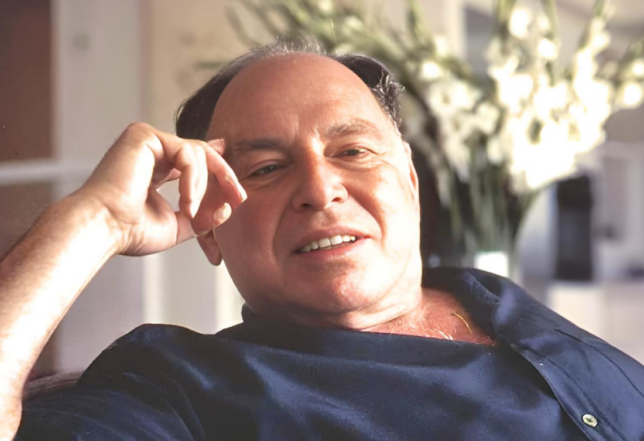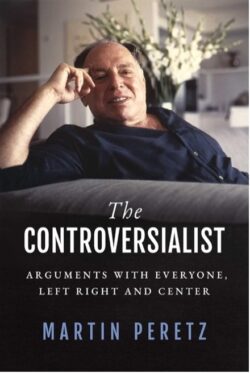Philanthropy
Martin Peretz on George Soros and His Philanthropy
 Martin Peretz.
Martin Peretz.

As 2024—the “biggest ballot year” in global history, including because of several important elections in Europe that will test and may further demonstrate the political ascendance of a conservative populism—begins, it might be worth noting observations about George Soros and his philanthropy by Martin Peretz in his The Controversialist: Arguments with Everyone, Left Right and Center last year. In the book, Peretz harshly critiques Soros and his giving to create a Karl Popper-like, democratic, and neoliberally capitalistic “open society” in Europe.
“Soros is an interesting man: generous, idealistic, and egomaniacal,” according to Peretz. Soros, the Hungarian-American billionaire and founder of the humongous Open Society Foundations (OSF), “sees himself at the center of a universe in a way that’s shaped by the trauma of a particular inheritance, a brush with brute force—the Holocaust,” Peretz continues. Soros was born in Hungary between World Wars I and II, and he escaped the Holocaust there by fleeing to London as a child.
With OSF, Soros “created a foundation that’s given billions of dollars to unimpeachably good causes and to people who I respect … and who I respect and love,” Peretz writes. “And in the process, he’s become a kind of hero to the One-Worlders.”
Formerly a Harvard professor, the provocatively iconoclastic, argumentative (as the book’s subtitle self-references), and apparently also irascible Peretz purchased The New Republic magazine in 1974 and filled various executive editorial roles there during the next almost 30 years, and on and off a little bit after that.
Soros came to American to work on Wall Street and, in 1970, founded Soros Fund Management. After making tens of billions of dollars, he “stepped into his philanthropic own” by founding OSF in 1993, Peretz recounts in The Controversialist. “He looked at Eastern Europe breaking open, and he saw an opportunity,” Peretz writes.
Soros’s was an aggressive brand of philanthropy: rather than adopt the customs of a particular society in hopes of changing it, he funneled money to universities and national foundations to open up these societies, using the force of the market. And this funneling synchronized with Soros’s financial interests, since he ran an international investment firm that could benefit only from a relaxation of borders and currency flows, the free market counterpart of a free society. If states were secondary, then not only culture but capital flows could be universal: barriers to movement, of people and finance, could be stripped away. It was a view as hostile to nationalism as it was to labor unions. But most people weren’t talking about it that way. Not then.
Himself self-interestedly, Peretz then takes the opportunity to disclose that Soros “sounded me out for advice about the Foundations, and it even seemed like he might want me to sit on his board.” The spoke for about 15 minutes, discloses Peretz, who later also wrote Soros “a long letter offering advice”—which Soros did not take, Peretz writes.
In his philanthropy, “Soros’s approach, like Hillary’s on healthcare, was top down, straight out of the management manuals the Clintons had read. So, to them his instincts where trustworthy,” according to Peretz—who then quotes Strobe Talbott, Deputy Secretary of State in the Clinton administration as saying Soros’ foreign policy was “compatible” with that of the U.S. government, “like working with a friendly, allied, independent entity, if not a government. We try to synchronize our approach to the former Community countries with Germany, France, Great Britain—and with George Soros.”
Peretz says he “felt like throwing up at this equation of Soros with NATO. Relying on Soros’s money didn’t actually solve the regions’ problem, which was above all political,” he continues. “If Orthodox Jews, Koreans, and blacks were having trouble getting along in a place as stable as New York City, imagine what it would be like in these newly awakened Eastern European nations.
“We soon found out,” according to Peretz.
Now, “George Soros, once considered by the Clinton White House a nation-state unto himself, is no longer,” Peretz writes in his conclusion to The Controversialist—citing a 2021 New York Times article about changes in OSF’s grantmaking. The article itself, by Peretz’s telling “was a kind of coda” to Soros’ 25-year project. He
was making severance payments to many of his philanthropies to focus on fighting the nationalist, tribal backlash that has made him—and his foundation—persona non grata in his native land of Hungary and has made Eastern Europe not one open society but dozens of distinct nationalities. What the article didn’t say is that Soros himself helped cause the tribal backlash and, in the process, he has proven the limits of his own vision: the open society and the open market that came with it, what we call neoliberalism or globalism, is not a beneficial thing when it’s pushed to its extremes—when it means the denuding of the nation-state or of national identity. What we’re seeing now, politically, is what comes from that extreme push.
This article originally appeared in the Giving Review on January 22, 2024.



